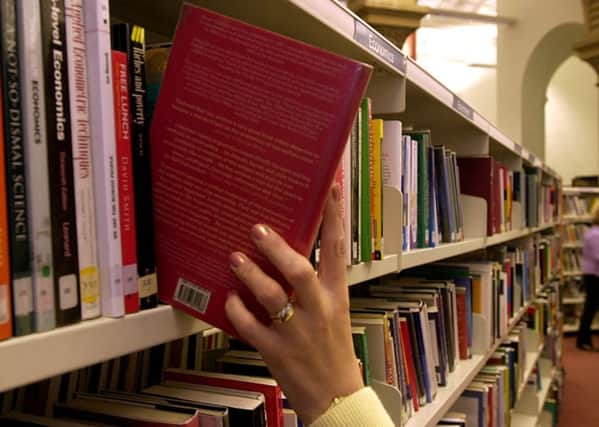YP Letters: Libraries are more than just books


IN reply to Mr Nick Keer over library closures (The Yorkshire Post, September 24), the main point about being a “technophobe in this modern world” simply doesn’t work.
The fact is people do socialise, and go out shopping. There are still bookshops that are thriving.
Advertisement
Hide AdAdvertisement
Hide AdEven using the technophobe argument, libraries are not just books, are they? Sadly many have closed or face closure, but these resource centres offer a wide range of services to a wide variety of individuals and families.
Working as a carer on minimum wage and paying council tax there are many local services I don’t use but I know we have a duty to provide them. Yes, Mr Keer, it would be a tragedy for all libraries to close.
From: S Sleeman, Trenic Crescent, Leeds
NICK Keer clearly doesn’t know the modern purpose of libraries, which involves far more than borrowing books.
First, he should use his computer to learn a little history.
Advertisement
Hide AdAdvertisement
Hide AdThis would show him that public libraries came about in the 1850s to enable working class people to read books. This upset some MPs who were worried about the social transformation that could result.
Today libraries still enable people – those who can’t buy books, computers, printers and photocopiers – to have access to them free of charge, together with audio books, ebooks, online magazines, story-telling for children and various groups and clubs.
Come on, Mr Keer. Stop being so self-satisfied with what you can afford and think of other people for a change – or perhaps you agree with that 19th century MP who didn’t want the poor to have access to knowledge.
From: Bryan Ibbotson, Toronto, Canada.
Here in Toronto the libraries are offering more to keep people interested.
Advertisement
Hide AdAdvertisement
Hide AdThey offer two online sites where you can download books for two weeks at no charge on to your iPad and you can even borrow an ebook.
I hate to hear of libraries closing; once they close it’s very hard to reverse the decision.
From: George Marsden, Colton, Leeds
HOME Secretary Amber Rudd has stated there will be no public inquiry into the Battle of Orgreave. Good.
It’s time to draw a line under this obsession with raking over the past. Comparisons with Hillsborough are as fatuous as they are offensive.
Advertisement
Hide AdAdvertisement
Hide AdThat inquiry was in response to a perverse inquest into the deaths of 96 people.
At Orgreave there were no fatalities, and the legal system worked – attempts to prosecute striking miners collapsed and half a million pounds in compensation was paid out.
The taxpayer shouldn’t have to foot the bill for another public inquiry.
Nor do we need a taxpayer-funded political exhumation of Arthur Scargill. He and his cronies destroyed their union and consigned the Labour movement to decades in the wilderness.
Advertisement
Hide AdAdvertisement
Hide AdOrgreave is a blight on history. And that’s where it should remain.
From: Peter Hyde, Driffield.
I PERSONALLY don’t have a problem with an inquiry into the so-called Battle of Orgreave but that inquiry must include the behaviour of Arthur Scargill’s flying pickets and the violence and threat by the striking miners to both police and lorry drivers trying to do their job.
Just watching the TV footage will make it clear that the strikers were not ‘whiter than white’ in this dispute. Let us not forget that the police were acting on orders from above and trying to get lorries through to deliver fuel against violence. Police officers are only human beings and can, as the miners did, get carried away when attacked. There was violence on both sides and that cannot be denied.
From: RF Tingle, Newburlington Road, Bridlington.
With regard to Adil Rashid feeling unable to play a match for Yorkshire, does it not make you wish that Alistair and Jonny Brownlee were cricketers?
From: Thomas W Jefferson, Batty Lane, Howden, Goole.
Advertisement
Hide AdAdvertisement
Hide AdTHERE have been two reports in the last week that should give us pause for thought.
The Bank for International Settlements (banker to the world’s central bankers and one of the few to warn of the 2008 financial crisis) has issued a report expressing serious concerns about the world economy next year, especially in the context of China’s slowing growth and excessive reliance on credit.
Another report, from the Jacques Delors Institute, tells us what we already know, that the euro will not survive the next financial crisis unless it undergoes urgent reform, including sharing of risk and sovereignty. Even if there was the political will to make those reforms, it would be many years before they could be implemented.
Lord King, the former Governor of the Bank of England, previously said that the euro must be split into two, if it is to survive, and that is probably the only feasible measure that could be taken urgently.
With the risks of inaction being so great, where are the international statesmen and women prepared to stand up and read the riot act to the EU?